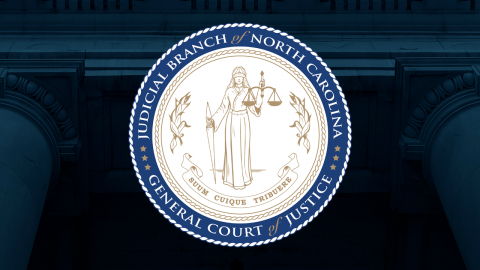About North Carolina Courts

Welcome
We are proud to welcome you to the official website of the North Carolina Judicial Branch. The mission of the Judicial Branch and its more than 7,000 elected officials and employees is
To protect and preserve the rights and liberties of all the people, as guaranteed by the Constitutions and laws of the United States and North Carolina, by providing a fair, independent and accessible forum for the just, timely, and economical resolution of their legal affairs.
With that mission in mind, we hope that this website will:
- Make our courthouses and processes more accessible for lawyers and litigants who have matters before the courts;
- Make our court system more transparent for those seeking to understand how our courts uphold the rule of law and administer justice with fairness and impartiality; and
- Make our court's online presence more responsive to the technologies and rhythms that define our personal and professional lives in the 21st century.
Each and every day, North Carolina's courts help provide safety for our communities, prosperity for our economy, and protection for the rights, liberties, and freedoms that sit at the foundation of our state and federal constitutions. We hope that you will find this website helpful as we continue our efforts to administer justice on behalf of the people of North Carolina.
Thank you for visiting!
About North Carolina Judicial Branch
Under the North Carolina Constitution, the Judicial Branch is established as an equal branch of state government with the Legislative and Executive branches. North Carolina’s court system, called the General Court of Justice, is a state-operated and state-funded unified court system. The General Court of Justice consists of three divisions: appellate, superior court, and district court.
The North Carolina Administrative Office of the Courts (NCAOC) is the administrative agency for the Judicial Branch. As such, it provides services and resources to help the unified court system to operate more efficiently and effectively, taking into account each courthouse’s diverse needs, caseloads, and available resources. Services include providing administrative support to the 7,000 employees of the Judicial Branch, which includes 555 independently elected judicial officials. The Judicial Branch has more elected officials than the Executive and Legislative branches combined, including justices, judges, clerks, and district attorneys.
The Chief Justice of the Supreme Court is head of the Judicial Branch and appoints a director to supervise the NCAOC. General Statute 7A–343 sets forth the duties of the director, which include budgeting and authorizing expenditures from appropriated funds, identifying staffing needs statewide, procuring and distributing equipment and supplies, and prescribing uniform practices for clerks. The director also makes recommendations for the overall improvement of the Judicial Branch.
All operating expenses of the Judicial Branch are paid by the state, including salaries and travel expenses of all court officials, juror and witness fees, and equipment and office supplies for the statewide judicial system. Counties and cities, however, are responsible for providing courtrooms and related judicial physical facilities.
Read more in the Judicial Branch overview fact sheet.
More Information
Careers
DO YOUR CAREER JUSTICE! Find Judicial Branch job openings and consider an exciting and rewarding career with us.
Data and Statistics
Access statistical information on special interest topics and trial court caseloads.
Judicial Branch Publications
Judicial reports, statistics, fact sheets, and more to inform stakeholders and the public on various court-related matters.
Judicial Districts Maps
Find current North Carolina district court, superior court, and prosecutorial district maps effective January 1, 2024.
North Carolina Judicial Fellowship
Judicial Fellows provide independent, confidential, and timely legal services for the judges.
Juror Appreciation Month
North Carolina celebrates jurors all year and sets aside July as Juror Appreciation Month.
North Carolina Administrative Office of the Courts
NCAOC provides centralized administration and budgeting services for the state’s courts.
Public Records Request
Find options to make a Judicial Branch record request depending on the type of record. Options may include online, by mail, or in person.